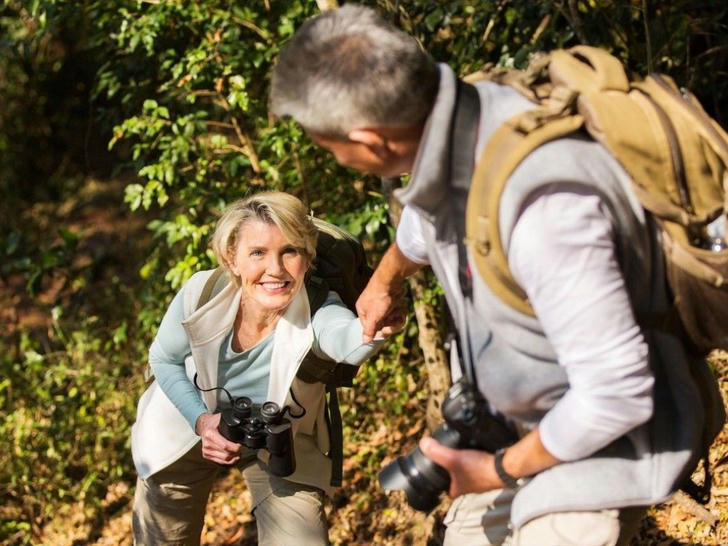Travel Tips for Seniors

Traveling can be an exciting experience at any age, but for seniors, it may come with its own set of challenges. As we get older, our bodies and health may require more attention, and the hustle and bustle of travel can sometimes be overwhelming. Seniors may face difficulties like limited mobility, health concerns, and concerns about safety. However, with a little planning and the right tips, traveling as a senior can be just as enjoyable and stress-free as it is for anyone else. Here’s a guide to help seniors travel comfortably, safely, and on their terms.
Packing Smart for Senior Travelers

One of the most important aspects of travel is packing. For seniors, packing can be more than just putting clothes into a suitcase; it’s about making sure that the essentials are easily accessible, and that nothing vital is forgotten. When planning for a trip, consider the following packing tips to make your journey more comfortable and convenient:
Health Essentials: Always pack any necessary medications, including extra doses in case of travel delays. Keep them in your carry-on bag rather than checked luggage for easy access. A list of your medications and dosages is also a good idea in case of emergencies.
Comfortable Clothing: Choose clothing that is comfortable and appropriate for the climate. Layering is key to staying comfortable in changing weather conditions. Avoid tight shoes or clothing that could become uncomfortable after long hours of travel.
Mobility Aids: If you need a cane, walker, or other mobility aids, don’t forget to pack them. Many airlines and travel companies provide accommodations for mobility devices, but it’s still important to double-check the details when booking.
Electronic Devices and Chargers: Smartphones, tablets, or e-readers can be great companions during travel. Don’t forget your chargers, power banks, and any devices that will help you stay connected with loved ones.
Travel Documents: Keep your passport, tickets, ID, and any required visas in a safe but accessible place. Consider using a neck pouch or travel wallet to keep important documents secure but within easy reach. Packing smart can ensure that you have everything you need for a relaxing and enjoyable trip, without the stress of realizing you’ve forgotten something important once you’ve already left.
Staying Healthy and Active While Traveling

As we age, staying active and maintaining good health is crucial, especially when traveling. Whether it's taking long flights, walking around new cities, or navigating public transport, staying healthy on the road can be a challenge. Here are some tips to help seniors stay active and healthy while traveling:
Exercise Routine: Keeping active on your trip is key to staying healthy. Simple exercises like walking, stretching, or using a stationary bike in a hotel gym can help maintain mobility and flexibility. Some hotels offer fitness classes, and even taking a few minutes every day to walk around the hotel can help keep your circulation going.
Stay Hydrated: Dehydration is a common issue for seniors while traveling. Make sure to drink plenty of water throughout the day, especially during flights and in hot climates. Carry a refillable water bottle with you and avoid sugary or caffeinated drinks that can dehydrate you.
Healthy Eating: Travel often means eating out, and while indulging in local cuisine can be part of the fun, maintaining a balanced diet is important for seniors. Look for restaurants that offer healthy options such as salads, grilled vegetables, and lean proteins. If you’re staying in a rental property or hotel with a kitchenette, consider preparing simple meals yourself.
Rest and Sleep: Traveling can be exhausting, so it's important to get enough rest. Try to maintain a regular sleep schedule and take short naps if needed to recharge. Bring items that help you sleep, such as earplugs or a sleep mask, to make your rest more comfortable.
By maintaining a health-conscious approach while traveling, you can ensure that your adventures are filled with energy and vitality.
Navigating Travel Insurance for Seniors

Travel insurance is one of the most important things to consider when planning a trip, especially for seniors. Healthcare needs may vary, and travel delays or cancellations could cause unexpected expenses. With the right coverage, you can travel with peace of mind knowing you’re protected in case of emergencies. Here are some key things to consider when looking for travel insurance:
Medical Coverage: Ensure that your policy covers medical expenses, particularly if you’re traveling abroad. Some domestic insurance plans don’t cover overseas medical care, so having travel insurance that covers these expenses is essential.
Trip Cancellation: Seniors often find that health issues or other unforeseen events can lead to canceled trips. Trip cancellation insurance can reimburse you for pre-paid expenses if you have to cancel your trip unexpectedly.
Emergency Evacuation: In case of a medical emergency that requires evacuation, make sure your travel insurance includes emergency evacuation coverage. This is especially important if you're visiting a remote area.
Pre-existing Conditions: Some insurance policies offer coverage for pre-existing medical conditions, but they often require you to purchase coverage within a specific window after booking your trip. Be sure to check the details when selecting your insurance plan.
Assistive Devices: If you require mobility aids or other devices, make sure your travel insurance covers these needs during your trip. Some policies may include reimbursement for damaged or lost medical devices.
Having the right insurance can make all the difference in ensuring a safe and stress-free trip. Be sure to shop around and choose a plan that meets your specific needs.
Managing Mobility Challenges While Traveling

Seniors with mobility challenges may face more obstacles when traveling, but that doesn't mean they should stay home. With the right planning, travel can be just as enjoyable for those with limited mobility. Here are some tips for making travel more accessible and comfortable:
Choose Accessible Destinations: When planning your trip, research destinations that are known for being accessible for people with limited mobility. Many cities and tourist attractions offer wheelchair ramps, elevators, and other amenities.
Use Special Travel Services: Many airlines, buses, and trains offer special assistance for seniors and those with mobility issues. Request assistance when booking your tickets to ensure a smoother experience.
Plan for Breaks: If you’re traveling by car or bus, plan regular stops to stretch your legs and avoid long periods of sitting. Look for hotels with easy access to amenities like restaurants, pools, and shops to avoid long walks.
Mobility Aids: If you require mobility aids, check with your travel provider to ensure your cane, walker, or wheelchair is accommodated. Many airlines allow mobility devices free of charge, but it’s always good to confirm in advance.
Pack Light and Smart: Travel with lighter luggage and use a rolling suitcase or backpack that you can easily manage. Consider using luggage with wheels or backpacks with built-in straps to reduce strain on your back and shoulders.
Traveling with mobility challenges requires some extra thought, but with proper planning, it is entirely possible to enjoy a fulfilling journey.
Travel Safety Tips for Seniors

When traveling as a senior, safety is always a top priority. Whether you're traveling locally or internationally, it's important to take extra precautions to ensure your well-being throughout the trip. Here are some travel safety tips for seniors:
Avoid Scams and Fraud: Seniors are often targets for scams, so be cautious when sharing personal information, especially when using public Wi-Fi networks. Avoid walking alone in unfamiliar areas, and be cautious when approached by strangers offering unsolicited help.
Secure Your Valuables: Keep your passport, cash, and other important documents in a secure place, such as a money belt or locked bag. When visiting busy tourist spots, be mindful of your belongings to avoid pickpockets.
Stay Informed: Research the area you're visiting before you go. Know the local emergency numbers, medical facilities, and transportation options in case something goes wrong during your trip.
Stay Connected: Share your travel plans with a family member or friend, and check in regularly to update them on your whereabouts. This can provide peace of mind for both you and your loved ones.
By following these safety tips, you can reduce risks and ensure a smooth, enjoyable travel experience.
Conclusion
Traveling as a senior can be an enriching and enjoyable experience, but it requires thoughtful planning. From packing smart and staying healthy to choosing the right insurance and managing mobility challenges, every detail plays a part in making your trip comfortable and stress-free. With these tips in mind, seniors can explore the world with confidence and ease, making memories that will last a lifetime. Happy travels!
